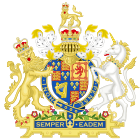
1670 (MDCLXX) was a common year starting on Wednesday of the Gregorian calendar and a common year starting on Saturday of the Julian calendar, the 1670th year of the Common Era (CE) and Anno Domini (AD) designations, the 670th year of the 2nd millennium, the 70th year of the 17th century, and the 1st year of the 1670s decade. As of the start of 1670, the Gregorian calendar was 10 days ahead of the Julian calendar, which remained in localized use until 1923.

William Kent was an English architect, landscape architect, painter and furniture designer of the early 18th century. He began his career as a painter, and became Principal Painter in Ordinary or court painter, but his real talent was for design in various media.
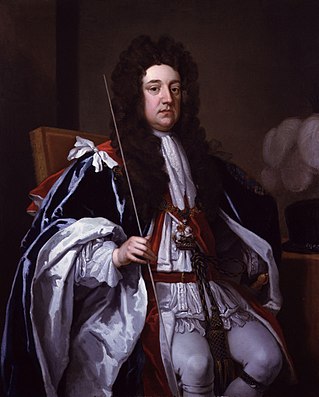
Sidney Godolphin, 1st Earl of Godolphin, was an English Tory politician and peer. He was a Privy Councillor and Secretary of State for the Northern Department before he attained real power as First Lord of the Treasury. He was instrumental in negotiating and passing the Acts of Union 1707 with Scotland, which created the Kingdom of Great Britain. He had many other roles, including that of Governor of Scilly.

The Georgian era was a period in British history from 1714 to c. 1830–1837, named after the Hanoverian kings George I, George II, George III and George IV. The definition of the Georgian era is also often extended to include the relatively short reign of William IV, which ended with his death in 1837. The subperiod that is the Regency era is defined by the regency of George IV as Prince of Wales during the illness of his father George III. The transition to the Victorian era was characterized in religion, social values, and the arts by a shift in tone away from rationalism and toward romanticism and mysticism.

The Exclusion Crisis ran from 1679 until 1681 in the reign of King Charles II of England, Scotland and Ireland. Three Exclusion Bills sought to exclude the King's brother and heir presumptive, James, Duke of York, from the thrones of England, Scotland and Ireland because he was a Roman Catholic. None became law. Two new parties formed. The Tories were opposed to this exclusion, while the "Country Party", who were soon to be called the Whigs, supported it. While the matter of James's exclusion was not decided in Parliament during Charles's reign, it would come to a head only three years after James took the throne, when he was deposed in the Glorious Revolution of 1688. Finally, the Act of Settlement 1701 decided definitively that Roman Catholics were to be excluded from the English, Scottish, and Irish thrones, later the British throne.
Early modern Britain is the history of the island of Great Britain roughly corresponding to the 16th, 17th and 18th centuries. Major historical events in early modern British history include numerous wars, especially with France, along with the English Renaissance, the English Reformation and Scottish Reformation, the English Civil War, the Restoration of Charles II, the Glorious Revolution, the Treaty of Union, the Scottish Enlightenment and the formation and the collapse of the First British Empire.
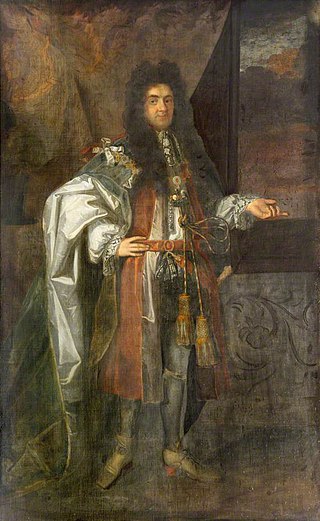
Christopher Monck, 2nd Duke of Albemarle was an English Army officer, peer, politician and colonial administrator who sat in the House of Commons from 1667 to 1670 when he inherited his father's dukedom and sat in the House of Lords.
Holiday Magic was a multi-level marketing organization, founded in 1964, by William Penn Patrick (1930–1973) in the United States. Originally the organization distributed goods such as home-care products and cosmetics. Company distributors were encouraged to recruit other distributors in a multilevel marketing structure, which was later characterized as a pyramid scheme.
Gregory King was an English officer of arms, engraver, cartographer and statistician.
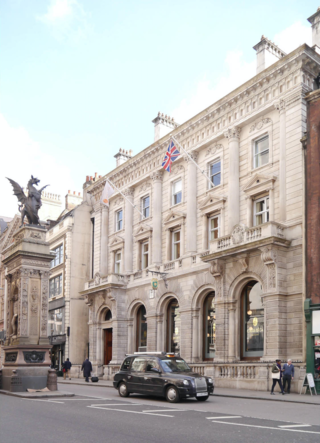
Child & Co. was a formerly independent private bank in the United Kingdom that was later part of the NatWest Group. The Royal Bank of Scotland incorporating Child & Co., Bankers was based at 1 Fleet Street on the western edge of the City of London, beside Temple Bar Memorial and opposite the Royal Courts of Justice. Child & Co. was authorised as a brand of The Royal Bank of Scotland by the Prudential Regulation Authority. The last remaining branch closed in June 2022, and it is no longer listed as one of the NatWest Group's brands.
The Fletcher Foundation was a nonprofit foundation that supported civil rights, education, and environmental education. The foundation supported efforts to develop a more just society with more equal opportunities for more of the population primarily by leveraging the financial and non-financial contributions of Fletcher Asset Management, the Fletcher Family including New York financier and philanthropist Alphonse Fletcher, Jr., and others. Fletcher Asset Management has been accused of fraud related to its management of funds and the value of pledges Fletcher's charitable pledges are in dispute. The Foundation lost its tax-exempt status in 2018.
The Charitable Corporation was an institution in Britain intended to provide loans at low interest to the deserving poor, including through large-scale pawnbroking. It was established by charter in 1707. Its full title was "Charitable Corporation for the relief of the industrious poor by assisting them with small sums upon pledges at legal interest". It became dishonest, and Smollett called it a "nefarious corporation". Certain of the directors speculated wildly and lost most of the shareholders' money.
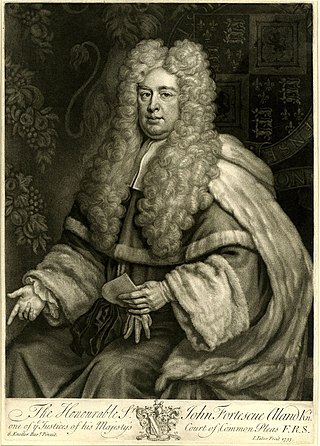
John Fortescue Aland, 1st Baron Fortescue of Credan was an English lawyer, judge, politician and peer who sat in the British House of Commons from 1715 to 1717. Aland wrote on English legal and constitutional history, and was said to have influenced Thomas Jefferson. A member of both the Middle Temple and Inner Temple, he became a King's Counsel in 1714 and was then appointed Solicitor General, first to the Prince of Wales and then to his father George I in 1715. After a short stint as a member of parliament, Aland was knighted and elevated to the Bench as a Baron of the Exchequer in 1717. He was subsequently a justice of the Court of King's Bench (1718–1727) and of the Court of Common Pleas (1728–1746), save for a brief hiatus between 1727 and 1728 which has been attributed to George II's displeasure with one of his legal opinions.
Edward Brerewood was an English scholar and antiquary. He was a mathematician and logician, and wrote an influential book on the origin of languages.

William Kurt Black is an American lawyer, academic, author, and a former bank regulator. Black's expertise is in white-collar crime, public finance, regulation, and other topics in law and economics. He developed the concept of "control fraud", in which a business or national executive uses the entity he or she controls as a "weapon" to commit fraud.

Francis Brerewood (1694-1781) was an English painter, translator and architect. He enjoyed the patronage of Benedict Calvert, 4th Baron Baltimore, painting portraits of Lord Baltimore's son Benedict, and decorating the apartments of the Calvert family seat at Woodcote Park. He became embroiled in unsuccessful litigation in 1746 following his father's death, and he died in poverty in 1781.
Country Party was the name employed in the Kingdom of England by political movements which campaigned in opposition to the Court Party.
Alan Joseph Bankman is an American legal scholar and psychologist. He is the Ralph M. Parsons Professor of Law and Business at Stanford Law School. He was also employed at FTX, the cryptocurrency company founded by his son, Sam Bankman-Fried, who is an entrepreneur and convicted felon. His tenure at FTX lasted until the company's bankruptcy and subsequent collapse in 2022.
Edward J. Balleisen is an American academic. He is a professor of History at Duke University, and the author or editor of several books.
Julian Hoppit FBA is an English historian, specializing in the early modern economic and political history of Britain.
